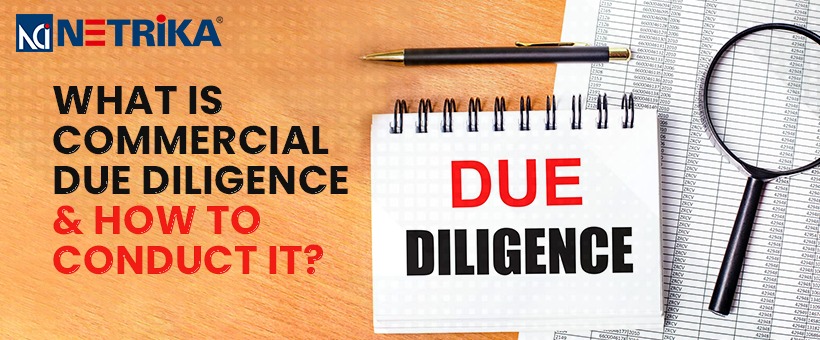- November 21, 2023
- Posted by: Netrika
- Category: Due Diligence

Commercial Due Diligence
Commercial due diligence is an investigation process performed by organisations to gather information on a target company looked at as a potential investment opportunity. The information includes its market standing, incremental value, products, services, and technologies it uses. This information is analysed to assess the company’s position relative to its competitors, revenue-improving opportunities, operational risks, and efficiency and then verify this data.
The commercial due diligence process is a part of a decision-making strategy for businesses to make more informed choices when considering investment, acquisitions, strategic decisions and partnerships.
Benefits of conducting commercial due diligence
As globalisation made the world more connected and easy to expand in terms of business opportunities, this expansion has also brought fierce competition and new markets. Hence, businesses require a commercial strategy to tap into the best-suited investment opportunity that captures more revenue and aids in market growth while eliminating the myriad of risks that come with it. This strategy of commercial due diligence can identify gaps in target companies while making business investments which can potentially cause financial losses or reputational damage in future.
- Commercial due diligence helps businesses identify the competitive landscape, and new market players positioning and assess their financial health
- With the understanding of the operational aspects of the target company, it can provide data on optimising it to reduce cost and improve efficiency.
- Commercial due diligence helps with legal and regulatory compliance reducing the risk of legal liabilities and issues.
- It can give the negotiators an upper hand to secure favourable agreements and ensure that the terms agreed upon are in line with the company’s market positioning.
- Knowing the investment’s associated costs, financial expectations and liabilities, your organisation is better prepared to deal with uncertainties.
- With information on technology and intellectual property, your organisation can leverage these assets better for the benefit of your company.
How to conduct commercial due diligence?
Commercial due diligence incorporates the key elements of financial evaluation, market analysis, operational assessment, intellectual property, technology, risk evaluation, legal due diligence, regulatory compliance and customer-supplier relationship.
The commercial due diligence checklist includes
- Defining the objectives of the commercial due diligence process in terms of vision, and mission.
- Gathering information such as financial statements, customer-vendor lists, agreements, contracts etc. with objectives kept in mind.
- Performing market research to get insights into the target company’s dynamics.
- Conducting financial analysis by scrutinising cash flow projections, financial statements, historical financial data etc. to identify their health.
- Performing operational assessments including its supply chain, manufacturing, quality assurance and control.
- Verifying legal and regulatory compliance including licences, contracts and legal agreements.
- Assessing intellectual property and technology including assets, legal issues on trademarks, patents etc.
- Reporting the findings with recommendations based on the assessment done.
- Decision-making whether or not the business investment is viable.
Commercial due diligence is a vital part of decision-making before investing in a business partnership or other business opportunities. Given the benefits and the risks of not making informed decisions, a thorough commercial due diligence process from a reliable service provider with a defined framework that is customised to the unique needs of organisations is necessary.
Netrika Consulting has a team of experts with experience that spans across the industry verticals to design and implement robust commercial due diligence in gathering information, analysing and verifying it to help you make better decisions when it comes to business investments.
